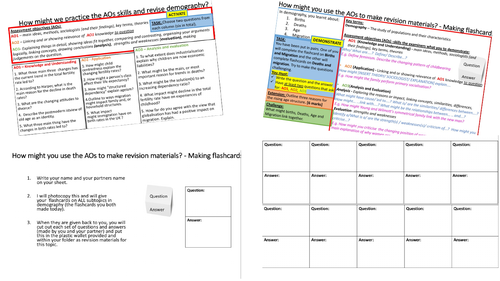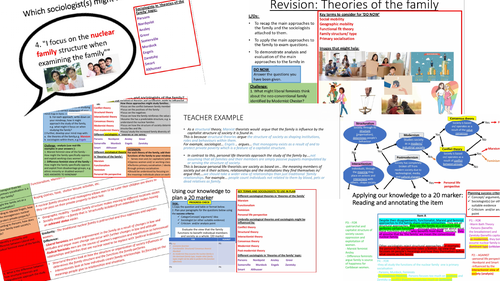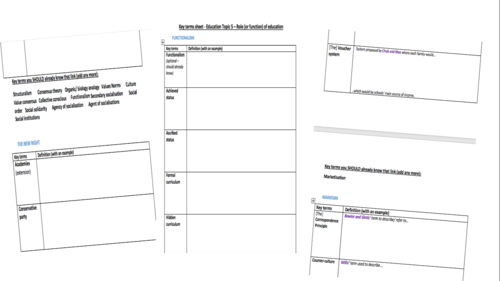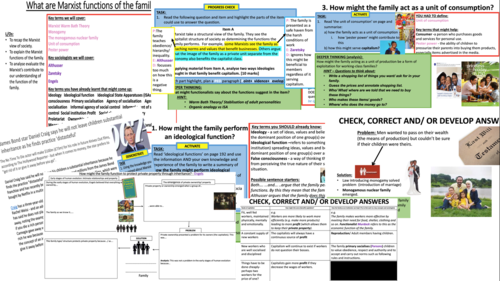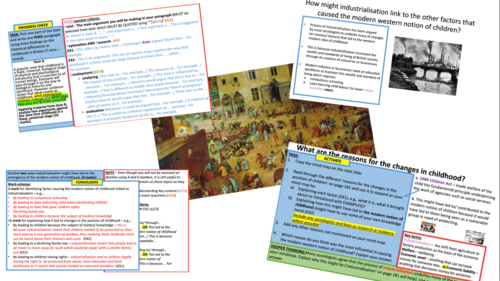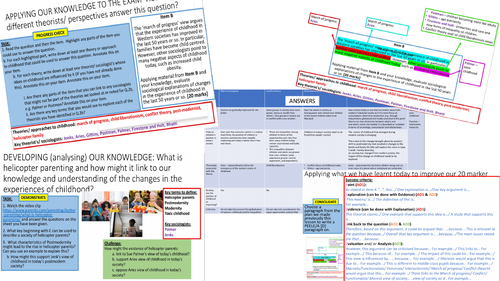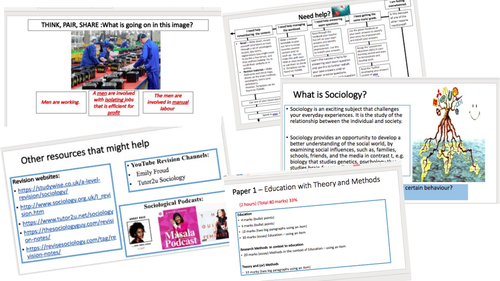
154Uploads
20k+Views
4k+Downloads
Sociology

AQA GCSE Sociology - Research Methods - Ethnography
Detailed lesson with lots of scaffolding based on adaptive teaching that help students understand what ethnography is as a research method and its main features, explain the strengths and weaknesses of using ethnographic research to study sociological issues and topics.
Cover the following key terms:
Ethnography
Triangulation
Includes 4 marker with success criteria for answering it
Covers the following sociologists:
Mead
Whyte
Young and Wilmott
ANSWERS TO SOME ACTIVITIES INCLUDED
RESOURCES CAN BE FOUND AT THE END OF PPT

GCSE Sociology – Introduction to Marxism
explores capitalism, profit, social class, ownership, interests, structuralism, conflict theories, exploitation, false consciousness and social relations of production as a way to introduce students to the main Marxist views and ideas.
Includes answers for main activities
Resources can be found at the end of the PPT.
Made to meet the AQA spec but can be used (and edited if needed) for other exam boards
Bundle

A-LEVEL SOCIOLOGY INTRO LESSONS - nature vs nurture, functionalism, marxism, feminism, QUIZ & ANSWERS
Detailed and differentiated (up and down) student-led lessons that help students to develop their knowledge and understanding from previous lesson(s). L2 uses page 8 from AQA Book 1 by townsend but CAN BE USED FOR ANY SPEC using resources within lesson (see below). Comes with key term sheet for the lesson.
1. Introduction to Sociology - provides an overview of Sociology course (spec to AQA A-level but can easily be edited to suit ANY SPEC and GCSE) and the sociological imagination.
2. How do sociologists explain behaviour? -Nature vs Nurture lesson -explores the nature vs debate, norms, values, socialisation (primary/secondary) and social control as an introduction to Sociology. Uses page 8 of the AQA A-level Book 1 by Townsend to introduces students to the nature vs nurture debate but this can be replaced and the rest of the lesson can still be used.
3. Introduction to functionalism -explores value consensus, social order, biological/ organic analogy, structuralism, consensus theories to introduce students to the key functionalist views and ideas.
4. Introduction to Marxism -explores capitalism, ownership, interests, structuralism, conflict theories, exploitation as a way to introduce students to the main Marxist views and ideas.
5. Introduction to feminism - explores sex, gender, gender roles, patriarchy, socialisation, gender inequality as a way to introduce students to the main feminist views of society and ideas.
6. Quiz lesson - small revision activity
25 min quiz (on nature vs nurture, key functionalist, Marxist, feminist’s ideas and terminology) —LESSONS CAN BE FOUND ON MAIN PAGE. Includes:
answers/ mark-scheme
scaffolding for students to peer assess (but quiz can also be marked by teacher)
Made for AQA but can be used for ANY SPEC
Can be differentiated down for GCSE, but I recommend purchasing the GCSE Intro lessons bundle which have alread been edited to meet the needs of KS4 students.

AQA A-level Sociology: Families Topic 4 ‘Demography’ Revision lesson
Detailed and differentiated (up and down), student led lesson created to help students recap key ideas examined in the demography topic of the family unit, make revision materials based on this content and be able to apply this knowledge to exam questions, particularly 10 markers that makes links between topics - This lesson is very helpful for developing the skills students need for to answer ‘Outline and explain’ 10 markers which requires students to demonstrate the ability to connect two elements, aspects, subtopics, or topics to answer the question.
Lesson also recaps the assesment objectives (but can be used to introduce students to the assessment objectives) (AOs – AO1, AO2 & AO3). The lesson requires students to answers questions based on each AO and then provides guidance and support for students to use the AOs to make flashcards (with questions and answers).
**RESOURCES CAN BE FOUND AT THE END OF THE PPT.
**

AQA A-level Sociology: Theories of the Family Revision lesson -How to further develop exam answers?
Detailed and differentiated (up and down), student led lesson that:
recaps the key sociologists students learn in this topic and what they say about the function(S) of the family.
recaps the main umbrella theories that students learn in year 12 (structuralism vs interactionism, modernism vs postmodernism and conflict vs consensus theories), how they view society and how this influences functionalist, marxist, feminist and personal life perspective approaches to the family.
how the knowledge above can be applied to exam questions to demonstrate both analysis and evaluation (AO3), e.g. by highlight the similarities and differences between the different theories of family or using knowledge of the umbrella theories to evaluate theories of the family.
supports students with planning a 20 marker on theories of the family using the item.
**RESOURCES CAN BE FOUND AT THE END OF THE PPT.
***
**ANSWERS FOR MOST OF THE ACTIVITIES CAN BE FOUND ON NEXT SLIDE AFTER ACTIVITY SLIDE
**
INCLUDES ORACY ACTIVITY

WRITING FRAME - AQA A-level Sociology: Families – Topic 3 Theories of the family 20 marker
Detailed writing frame that scaffolds (from introduction to conclusion) a full answer for a 20 marker on the family being beneficial (family -topic 3 theories of the family). Models how to use the item to select points or arguments to answer the question.
*** Based on AQA specification**
Supports students with planning the 20 marker (using the item) - using planning success criteria.
Outlines the success criteria and provides sentence starters for the full essay (intro, main body and conclusion). Success criteria used for paragraphs in main body of essay is PEELE/A
Outlines the key terms, sociologists, theories that can be used when answering the question.
Supports students who need support and guidance with writing essays whilst providing students who are already good at writing essays opportunities to further improve their essay skills.
Bundle

AQA A-LEVEL Sociology Family Topic 2 Childhood - LESSONS, KEY TERM SHEET AND REVISION LESSON
LESSONS
L1 - Detailed and differentiated student-led lesson that explores childhood, social constructionism, industrialisation (briefly), the globalisation of western childhood , western notion of childhood as a way to introduce students to the idea of the social construction of childhood. Mostly focusses on cross-cultural differences in childhood but briefly covers historical differences of childhood in Britain. Explores the views of sociologists such as Pilcher, Benedict, Wagg, Punch, Holmes, Firth and Malinowski. AQA A-level Families Topic 2 Childhood- Lesson 1
L2 - Detailed and differentiated student-led lesson that explores Pre-industrial society, Industrialisation, Modern western notion of childhood, ‘cult of childhood’, Child-centredness/centred society , Infant mortality, as a way to examine Aries views and explanations of the historical differences in western childhood.
L3 - Detailed and differentiated student-led lesson that explores Information hierarchy , Postmodernity/ postmodern society/ contemporary society, Modernity/ modern society/ industrial society, Accordion family, Boomerang children as a way to examine the changes to the modern western notion of childhood in contemporary society. Covers the views of Postman and Jenks.
L4 - Detailed and differentiated student-led lesson that explores march of progress theory, Toxic childhood, Conflict theory, Age patriarchy, Child liberationism as a way to examine the different views (march of progress and conflict views) of whether childhood has improved over time. Includes views of Gittins, Palmer, Firestone and Holt, Aries etc.
KEY TERM SHEET
Alphabetical key term sheet for AQA A-level Sociology Family Topic 2 Childhood that requires students to fill out the definitions themselves. Includes some sentence starters for more difficult key terms.
**Good form of revision for students and can be used as a revision resource to develop AO1 once filled out. **
**BASED ON CONTENT in textbook - AQA A Level Sociology Book One Including AS Level: Book one 3rd Revised edition by Rob Webb, Hal Westergaard, Keith Trobe, Annie Townend ’ textbook
**REVISION LESSON **-
Detailed and differentiated (up and down) student led lesson that supports students in recapping the main theories, views and explanations of the position of childhood; examines how march of progress, conflict, child liberationists and postmodernist theories’ view society and how this might influence their approach or view of childhood and its changes over time. Also highlights the key sociologists (Katz, Postman, Aries, Palmer, Jenks, Gittens) in this topic.
The lesson then requires students to apply this knowledge to plan (using a success criteria) a 20 marker and write at least one paragraph for it.

KEY TERMS SHEET - AQA A-level Sociology Education: Topic 5 Role of Education
Alphabetical key term sheet for AQA A-level Sociology Education Topic 5 Role of education that requires students to fill out the definitions themselves.
*** Includes some sentence starters to model to students how to incorporate key sociologists into their definitions. **
*** Key terms separated into Functionalist, New Right and Marxist key terms. **
*** Includes a section with key terms that students should know from previous learning (intro to sociological theories and topic 1-4 of education) that link to this topic. **
Good form of revision for students and can be used as a revision resource to develop AO1 once filled out.
**BASED ON CONTENT in textbook - AQA A Level Sociology Book One Including AS Level: Book one 3rd Revised edition by Rob Webb, Hal Westergaard, Keith Trobe, Annie Townend ’ textbook

AQA A-level Sociology Families: Theories of the family – Marxist functions of the family
Detailed and differentiated (up and down) student-led lesson that examines, analyses and evaluates Marxists Althusser, Zaretsky and Engels’ views and functions of the family.
Lesson explores the concepts: Marxist Warm Bath Theory, Monogamy , The monogamous nuclear family , Unit of consumption, Pester power, ideology, ideological function, false consciousness
Lesson makes links to general Marxist key terms and other family key terms that students might have previously been taught.
Main activities makes reference to AQA A-level Book 1 by Townsend
Includes exam questions and guidance for answering them.
***** MOST ACTIVITIES INCLUDE ANSWERS****
Starter assesses prior learning on Parson’s functions of the family
***** WORKSHEETS AT THE END OF THE PPT****

A-level AQA Families Topic 2 Childhood– The historical differences in childhood
Detailed and differentiated student-led lesson that explores Pre-industrial society, Industrialisation, Modern western notion of childhood, ‘cult of childhood’, Child-centredness/centred society , Infant mortality, as a way to examine Aries views and explanations of the historical differences in western childhood.
Activities require pages from the AQA A Level Sociology Book One Including AS Level: Book one 3rd Revised edition by Rob Webb, Hal Westergaard, Keith Trobe, Annie Townend
RESOURCES CAN BE FOUND AT THE END OF PPT
STUDENT-FRIENDLY MARK-SCHEME INCLUDED FOR 4 MARKER

AQA A-level Sociology -Developing AO3 skills - Explicit criticisms and explained analysis
Detailed student led lesson on what is meant by explicit (vs juxtaposed) criticisms and explained analysis and how to demonstrate these high level AO3 skills needed for A*-A answers for AQA exams. The lesson is adapted to stretch and challenge the most able whilst scaffolding to allow pupils who need support the opportunity to access higher level thinking.
INCLUDES:
SIX MODEL PARAGRAPHS- from theory and methods (postmodernism and Marxism), methods in context, crime (punishment), media and family. THOSE WHO DO NOT TEACH FAMILY OR MEDIA will have 4 model paragraphs in total)
ANSWERS FOR ACTIVITIES
AfL
A 7 page information sheet on explicit criticisms and explained analysis from the skills booklets (can be bought separately - includes other guidance and skills for preparing for exams) that explain the two different skills, success criteria with sentence starters of how to demonstrate each and provides brief examples (of explicit criticisms, juxtaposed criticisms, explained analysis, analysis that is limited to an isolated statement). Also includes analysis guidance and sentence starters for research methods paragraphs and guidance of how students might go even further by explaining their criticisms.
**NOTE **- Activity on slide 8 is challenging. If students struggle too much with it, show answers on slide 9 and move onto the progress check activity that will make clearer how explicit criticisms are written.
**NOTE ** -The focus of evaluations are criticisms for this lesson
RESOURCES CAN BE FOUND AT THE END OF THE PPT (AND INFO SHEET FROM SKILLS BOOKLET IS ATTACHED AS A WORD DOC)

AQA A-level Families- Couples: Women’s involvement in paid work
Detailed and differentiated (up and down) student-led lesson that examines and analyses the following key terms to examine march of progress and feminist views of how women’s involvement paid work has had an impact on the domestic division of labour:
Dual‐earner couples, The New man, The ‘march of progress’ view
Double shift / dual burden, Triple shift, Emotion work, Cultural/ Ideological explanation (of segregated conjugal roles), Material/ Economic explanation (of segregated conjugal roles)
Ideology, Geographic mobility (extension), Commercialisation (extension)
Examines the ideas of :Young and Wilmott, Oakley, Hochschild , Gershuny/ Sullivan, Ferri and Smith, Crompton and Lyonette
***** Makes reference to other key terms students might know that link. **
****ALL RESOURCES INCLUDED AND CAN BE FOUND OUT THE END OF PPT ***
Uses and refers to ’ AQA A Level Sociology Book One Including AS Level: Book one 3rd Revised edition by Rob Webb, Hal Westergaard, Keith Trobe, Annie Townend ’ textbook

L5 AQA A-level Families- Couples: Domestic violence
Detailed and differentiated (up and down) student-led lesson that examines and analyses the following key terms to examine patterns and explanations of domestic violence: Domestic violence/ abuse, Radical feminists, Materialism,
Marxist feminism, Radical feminist explanation (of domestic violence)
Marxist feminist explanation (of domestic violence),Materialist explanation (of domestic violence)
Examines the views of the following sociologists: Dobash and Dobash, Millet and Firestone, Wilkinson and Pickett, Ansley
***** Makes reference to other key terms students might know that link. **
***** ANSWERS to MAIN activities INCLUDED****
Uses and refers to ’ AQA A Level Sociology Book One Including AS Level: Book one 3rd Revised edition by Rob Webb, Hal Westergaard, Keith Trobe, Annie Townend ’ textbook

AQA GCSE Sociology - Research methods - Structured and Unstructured interviews
Detailed lesson with lots of scaffolding based on adaptive teaching that help students understand the advantages and disadvantages of using interviews for investigating sociological issues (e.g. identifying the different types of interviews and their features, explaining the strengths and weaknesses of structured and unstructured interview and be able to apply out knowledge of the strengths and weaknesses of structured and unstructured interviews to 4 markers).
Covers the following key terms: Structured interview, Unstructured interview, Semi-structured interview, Group interviews (Focus groups), Interviewer bias/ effect, Interview schedule
This lesson introduces students to all types of interviews but only looks at the strengths and weaknesses of structured and unstructured interviews.
ANSWERS TO MOST ACTIVITIES INCLUDED
RESOURCES CAN BE FOUND AT THE END OF THE PPT

AQA GCSE sociology - Research Methods: Observations
Detailed lesson with lots of scaffolding based on adaptive teaching that help students understand what are the strengths and weaknesses of using observations to investigate sociological issues (e.g. identifying the different types of observations and their main features, explain the strengths and weaknesses of using the different types of observations to investigate sociological issues and to apply our knowledge of strengths and weaknesses of one or ore observations to an exam question.
Covers the following key terms:
Observation
Participant observation
Non-participant observation
Covert observation
Overt research
Hawthorne / Observer effect
Observation schedule
Overt research (extension)
Covert research (extension)
Key terms you should know that link:
Pre-determined - Closed questions - Open questions - Quantitative data vs
Qualitative data - Reliable vs Valid - Practical issues - Ethical issues - Theoretical issues - Positivism vs Interpretivist - Sample size - Representative sample - Generalise findings - Respondent - Standardised
ANSWERS TO ALL ACTIVITIES INCLUDED
Includes an exam style 4 marker with scaffolding and a detailed student friendly mark-scheme
Does NOT cover structured and unstructured observations as it is not in the specification and its quite complex.
Includes a key term sheet and definitions

AQA GCSE Sociology: Family- Marxist functions of the family (Zaretsky)
Detailed lesson with lots of scaffolding based on adaptive teaching that help students understand marxist functions of the family (Zaretsky)
Includes key term sheet with definitions for the lesson (new key terms but also key terms that students should have been taught previously that link to this lesson)
Includes 4 marker ‘perspective’ exam question and provides scaffolding to help students answer it and includes student friendly mark-scheme for peer or self assessment.
ANSWERS TO MAIN ACTIVITIES INCLUDED
Covers the following key terms: Unit of consumption, The Marxist Warm Bath Theory, Socialism
Covers the following key sociologists: Zaretsky
Covers the following key terms that should already be known: Family form – Convention nuclear family – Bourgeoisie - Proletariat – Unit of consumption – Economic function – Stabilisation of adult personalities (The Warm Bath theory) - The traditional domestic division of labour - The contemporary domestic division of labour -Capitalism - Marxism - Profit - Social class - Ownership – Exploit - Inequality - Capitalism - Means of production - Structuralism vs Interactionism - Conflict vs Consensus theory - Agency of socialisation - Agents of socialisations – Systems – Processes - Agency of social control - Agents of social control - Culture - Norms - Values Social processes - Social structures - Positive sanctions Negative sanctions - Socialisation - Primary socialisation - Secondary socialisation
Makes references to key terms students should know – Promotes a spiral curriculum by making links to key terms that students might have previously been taught that link to this lesson.
RESOURCES CAN BE FOUND AT THE END OF PPT

AQA GCSE Sociology- Research Methods - Case studies
Detailed lesson with lots of scaffolding based on adaptive teaching that help students understand how to describe a case study and how it might be used to investigate sociological issues, explain the advantages and disadvantages of using a case study to investigate sociological issues.
Covers the following key terms: Case study, Mixed methods, Triangulation
Key terms and studies you should know that link: Secondary vs Primary methods and data, data, Quantitative vs Qualitative data
Resources can be found at the end of the PPT
Answers to all activities
Includes key term and definition sheet for the lessons

AQA A-level Sociology: Families Topic 2 ‘Childhood’ Revision lesson
Detailed and differentiated (up and down) student led lesson that supports students in recapping the main theories, views and explanations of the position of childhood; examines how march of progress, conflict, child liberationists and postmodernist theories’ view society and how this might influence their approach or view of childhood and its changes over time. Also highlights the key sociologists (Katz, Postman, Aries, Palmer, Jenks, Gittens) in this topic.
The lesson then requires students to apply this knowledge to plan (using a success criteria) a 20 marker and write at least one paragraph for it.
RESOURCES CAN BE FOUND AT THE END OF THE PPT.
MODEL PLAN AND ANSWERS FOR MAIN ACTIVITY CAN BE FOUND ON NEXT SLIDE AFTER ACTIVITY SLIDE

Introduction to Sociology lesson
This is a lesson I use as an introduction to the AQA A-level Sociology course and to the sociological imagination or line of inquiry. The lesson includes:
an overview of the course, exam and curriculum
activities to introduce students to Sociology and sociological thinking/ inquiry.
suggested reading, podcasts, revision websites youtube channels that students can use to develop their knowledge and understanding of key ideas and concepts.
Expectations
Can be easily edited to meet your needs, e.g. specification, expectations and can also be used as an introduction to AQA GCSE Sociology .

GCSE Sociology – Introduction to Feminism
explores sex, gender, gender roles, patriarchy, gender inequality as a way to introduce students to the main feminist views of society and ideas.
Includes answers for main activities
3 marker with a success criteria and student friendly mark-scheme
Resources can be found at the end of the PPT (worksheet is in folder).**
Made to meet the AQA spec but can be used (and edited if needed) for other exam boards




